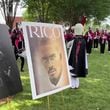Around the corner from the towering Christmas tree that fills the Gold Dome’s rotunda will soon stand - for one day at least - an entirely different sort of spectacle.
A six-and-a-half-foot pole splotched with rainbow colors, highlighted by purple glitter and topped with a shiny disco ball will rise above the South Wing of the state Capitol on Dec. 23 to commemorate a made-up holiday invented for a 1990s sitcom.
The "Gay Pride Festivus Pole" will serve as a reminder that the court rulings and state laws that seek to protect religious symbols in government buildings can cut both ways. And, in this case, that means allowing a sparkly pole to share space with portraits of famed Georgia leaders at the Gold Dome's most prestigious real estate.
If Georgia officials, who allowed the display Tuesday of a Nativity scene on the second floor of the Capitol, had rejected the Festivus pole, it would have surely invited a lawsuit from atheists groups or organizations that seek to preserve the separation of church and state.
“They made a request and they met the criteria,” was all that Steve Stancil, the head of the Georgia Building Authority, would say about the decision.
The petition was made by a free-speech group - known as The Humanity Fund - as a test case to see how far Georgia authorities were willing to go. The pole is inspired by the fictional Dec. 23 holiday - featuring an annual "airing of grievances" and "feats of strength" competition - popularized in a 1997 Seinfeld episode.
“Why Georgia? Really? Why not, given Georgia’s historical tolerance for differing views (wink),” Chad Stevens, the group’s director, wrote in an email.
A similar pole has already graced the statehouse in Florida, and Stevens said there are plans to mount them in Illinois, Michigan and Washington this winter. It was also recently approved by officials in Oklahoma, where a spokesman said it was "no different than somebody standing with a sign in the rotunda."
Courts typically allow religious displays on government property as long as they don’t create the impression that the government endorses or disapproves of a particular religion. That’s why displays during the holidays often include symbols celebrating both Hanukkah and Christmas, as well as secular traditions, said Anthony Kreis, a constitutional scholar at the University of Georgia.
Some governments have tried to skirt the debate by creating a public forum where outside groups can display on government grounds. In Florida, it led to the bizarre scene of the Festivus pole sharing space with a display of the Nativity and shreds of cardboard with googly eyes called the Flying Spaghetti Monster.
There had been no successful attempt to bring monster deities or other off-the-wall creations to Georgia - until this week's petition by Stevens. State officials were reminded that rejecting it would have been problematic, especially given the Nativity scene on display Tuesday on the second floor of the Capitol.
The privately-funded display was organized by the Georgia Nativity Scene Committee, part of a national group that last year sponsored similar scenes in 24 states. It's defended by the Thomas More Society, a legal rights organization, which called it constitutionally-protected free speech and an expression of religious faith.
“The government is neither censor nor endorser of such religious speech,” said Tom Brejcha, the group’s president. “In the capitol, where political rallies are routinely held during government sessions, the government is merely the gatekeeper upholding free speech.”
Stevens flipped that same argument to push his Festivus pole, which commemorates a holiday that features a family dinner where celebrants get to “tell them all the ways they have disappointed you over the past year.”
“I officially declare victory in our gay war on Christmas,” said Stevens, reveling in his win.
Kreis, for one, sees an opportunity for catharsis before an upcoming election-year legislative session.
“If Festivus comes to the Gold Dome, perhaps the airing of grievances in December will make for a less contentious legislative session come January,” Kreis said. “Though, I worry about the feats of strength.”







